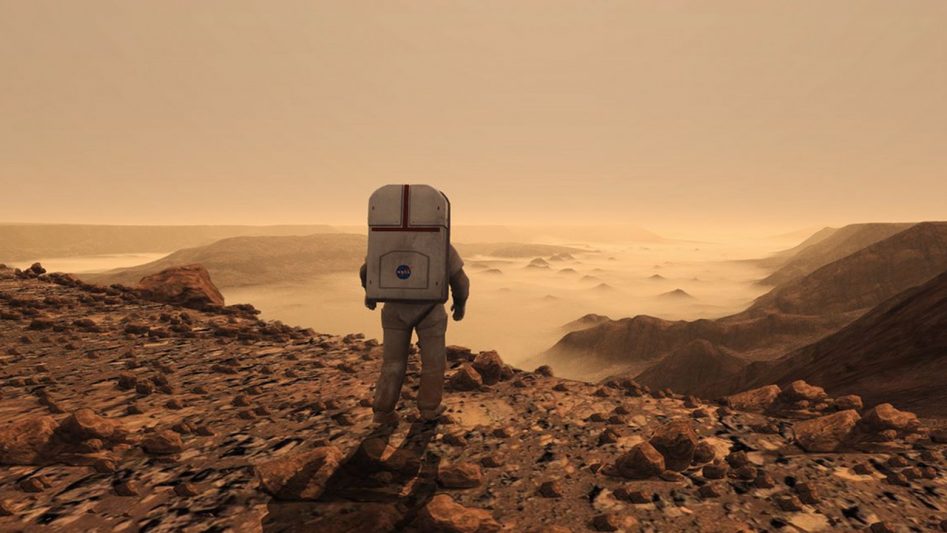So you want to go to mars…
Mars is the fourth planet in our solar system, named aptly for the Roman god of war! Historically observed by astronomers as early as 1045 BCE. by early astronomers across the ancient world. What do we know about mars? Mars is a dead world devoid of life. For various reasons Mars has become dry. mars is cold and arid, with very little usable oxygen. There are almost no reducing agents to offset the carbon dioxide.
The atmosphere on Mars is comprised of 95.32% CO2, and temperatures can drop to -60 Celsius. With little to no usable surface water, why would we want to go to Mars?. It is widely thought that in order to continue humanity, we must become an interplanetary species! Considering this is an important step to becoming a space-faring civilization, and the prevention of our extinction is imperative!. There are various technical challenges and very real problems to inhabiting mars.
- How do we generate power on mars?
- Where do we get our water?
- How do we keep ourselves fed and happy?
- How do we stay sane while staying in compact habitats under tight living constraints?
Let’s answer these questions.
Electricity: Generating power on mars will require various methods as a redundancy. Where as. if one set of systems fail; a second backup system will be required. In addition to solar energy; which is considered 7% efficient here on earth. Radioisotope thermal-electric generators will be required to produce the bulk of the energy. During times where power needs are greater, or the access to solar energy is limited, an RTG is required. Without a doubt, electrical power for our habitation and manufacturing needs will be an on going technical issue. Continuous cleaning of solar cells and preventative maintenance will be vital for human survival on the red planet.
Water: hydrogen/oxygen condensation is one method to produce the byproduct water. This method would be exceptionally dangerous within a habitation environment. Hab modules need to be oxygen rich in order for the occupants to survive!. Producing water externally and safely away from the habitat will be prudent. The explorers of the future mars missions will require access to water.
We expect that the moisture on mars is locked below the surface soil of mars. Resource utilization is critical to martian survival. Using the moisture found below the surface of mars will be essential for making pure water. The process of making water requires capture of martian minerals with a higher moisture content. Super-heating of those minerals release the vapors from the rock and collected via a condenser, then filtered for impurities. Producing water requires consistent electricity!. (Subsurface moisture can also be used to produce the components for rocket fuel).
How do we keep fed and happy: The human body requires a balanced diet to survive! without our food we develop physical deficiencies due to a lack of proteins, vitamins and nutrients. The body cannot do without these key essentials! After a very short span of time, people become prone to high emotions or make mistakes with tremendous risks involved. Since our explorers will need to successfully grow and produce food from soils which lack the basic nutrients for plant growth. We will have to make our own fertilizers from various sources. Spending millions to send fertilizer to mars is not financially feasible.
where do we get our protein from?
During the exploration age, people brought livestock with them aboard their ships on long voyages across the seas. They would resettle and breed their cattle. Since bringing cattle with us into space is not practical, we as humans will have extract proteins from bacteria. Sorry, there wont be steak on mars! Everything you find will likely be the product of a petri dish and in a powdered format.
Staying sane: Many humans hate being indoors on a rainy day. If you live near the poles, there are months of little to no light with dense snow and extreme cold. Hence Mars is no exception! The problem? there is very little air to breathe. On mars It’s even colder than earth and it’s day/night cycle is an extra half hour longer.
On earth one might read a book. Yet on Mars one may run out of reading material very quickly. (There are no public libraries within 228 million kilometers from mars). Equally People will need to work constantly to occupy their time, keep their minds active and away from negativity. We will also need to socialize and take time for ourselves while in a confined space…
Gardening and horticulture on mars may be peaceful but requires constant dedication and careful precision. the chemistry involved would make a typical gardener pull their hair out!. It will be a struggle to keep plants alive in a greenhouse on mars…
Further generations will have to find creative ways to live on the red planet!
So why travel to mars now rather than later?
Furthermore, to answer this question… why is going to mars so important?. Earth is a fragile ecosystem, It supports more than 7,000,000,000 people!. It is a fact with our growing human population we are reaching the point of a non sustainable environment. With the continued risks to our planet from other sources such as killer asteroids it makes sense that we would want to find other places to perpetuate humanity just a little while longer. Why we want to go sooner than later is because the longer we wait to become an interstellar species the greater the risk to us on earth from self destruction or from external destruction.
Why the red planet? This world is simply a baby step in the process of colonizing the wider solar system at large. if humanity can survive on mars we can live anywhere we can place habitation.
Yes, there are risks but the risks involved answer the critical question of can we survive there…


Comments
Electricity section, the efficiency of solar energy is either 7% or 0.07 and it should not be 0.07%.
I’ve made the appropriate corrections. I am only human Sanji.
“It is a fact with our growing human population we are reaching the point of a non sustainable environment.”
In order to counter brainwashed people making ignorant and hysterical statements such as this – as “fact”, ask this: “How many people was the earth designed to sustain?” If the answer is lower than the current number, insist that the elitist personally begin the process of depopulation immediately.